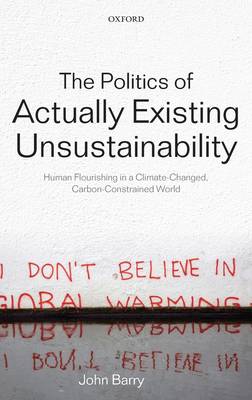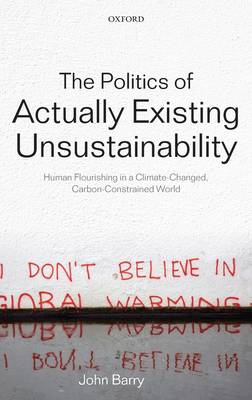
- Afhalen na 1 uur in een winkel met voorraad
- Gratis thuislevering in België vanaf € 30
- Ruim aanbod met 7 miljoen producten
- Afhalen na 1 uur in een winkel met voorraad
- Gratis thuislevering in België vanaf € 30
- Ruim aanbod met 7 miljoen producten
Zoeken
The Politics of Actually Existing Unsustainability
Human Flourishing in a Climate-Changed, Carbon Constrained World
John Barry
Hardcover | Engels
€ 249,95
+ 499 punten
Omschrijving
Going against both the naive techno-optimism of 'greening business as usual' and a resurgent 'catastrophism' within green thinking and politics, The Politics of Unsustainability offers an analysis of the causes of unsustainability and diminished human flourishing. It makes a case for seeing that it is profound and deepening unsustainability and growing injustice that characterises the modern world, and that therefore the focus of green or other progressive thinking should shift from its current framing in terms of 'sustainability', 'sustainable development', and 'theories of justice'. The book locates the causes of unsustainability in dominant capitalist modes of production, debt-based consumer culture, the imperative for orthodox economic growth, and the dominant ideology of neo-classical economics. At the level of developing a progressive and critical theoretical understanding of unsustainability, it argues for the importance of integrating vulnerability, which has been largely neglected by both mainstream western political theory and analyses of the current global ecological crisis. It suggests that valuable insights into the causes of and alternatives to unsustainability can be found in a critical embracing of human vulnerability and dependency as both constitutive and ineliminable aspects of what it means to be human. Rather than seeing invulnerability as the appropriate response, the book defends resilience, and the ability to 'cope with' rather than 'solve' vulnerability, as more productive. The Politics of Unsustainability offers a trenchant critique of the dominant neo-classical economic groupthink, which the book argues must be seen not as some value neutral form of 'expert knowledge' but as a thoroughly ideological 'commonsense' that has corrupted and limited creative ways of thinking about and through our current predicament. It offers a green political economic alternative which replaces economic growth with economic security, and views economic growth as having done its work in the minority, affluent world, which should now focus on human flourishing and lowering socio-economic equality and fostering solidarity as part of that new re-orientation of public policy. Complementing this green political economy, The Politics of Unsustainability outlines and develops an account of 'green republicanism', which represents an innovative and original contribution to debates on the political responses to the crises and opportunities that constitute global unsustainability. The Politics of Unsustainability draws widely from a range of disciplines and thinkers, from cultural critic Susan Sontag to the critical theory of the Frankfurt school, contemporary debates in green political thinking, and the latest thinking in heterodox and green economics, to produce a highly relevant, timely and provocatively original statement on the human predicament in the 21st century
Specificaties
Betrokkenen
- Auteur(s):
- Uitgeverij:
Inhoud
- Aantal bladzijden:
- 352
- Taal:
- Engels
Eigenschappen
- Productcode (EAN):
- 9780199695393
- Verschijningsdatum:
- 30/04/2012
- Uitvoering:
- Hardcover
- Formaat:
- Genaaid
- Afmetingen:
- 156 mm x 234 mm
- Gewicht:
- 666 g

Alleen bij Standaard Boekhandel
+ 499 punten op je klantenkaart van Standaard Boekhandel
Beoordelingen
We publiceren alleen reviews die voldoen aan de voorwaarden voor reviews. Bekijk onze voorwaarden voor reviews.











